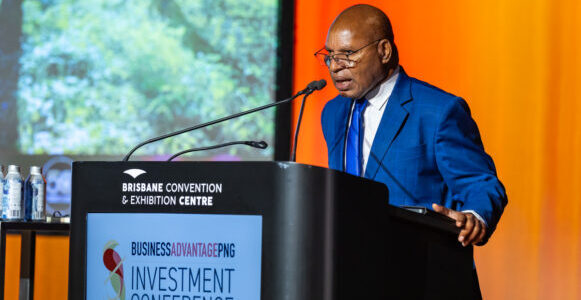Richard Maru, Papua New Guinea’s Minister for International Trade and Investment, outlined the Marape-Rosso government’s wide-ranging plans to transform the economy in the opening address at the 2025 Business Advantage PNG Investment Conference.

PNG’s Minister for International Trade and Investment, Richard Maru. Credit: BAI/Stefan Daniljchenko
Papua New Guinea must chart a “new roadmap” to transform its economy, International Trade and Investment Minister Richard Maru told the 2025 Business Advantage PNG Investment Conference in Brisbane on Monday.
Speaking ahead of the nation’s 50th anniversary of independence in September, Maru said the government has established a committee to review the economic performance of the last 50 years and formulate a 20-year development plan.
““We are willing to give incentives to compete with the rest of the world.”
“Our biggest failure since independence is our inability to grow our economy,” he said.
“Given our [natural] resources, it does not make sense. Something is very, very wrong… We must change the way we do business, make hard decisions and bring in investors.”
Bold plans
Reaffirming the government’s “bold plan” to balance the budget by 2027, Maru declared that “next year [2026] is the last that we will borrow.”
Key economic priorities, he said, will include replacing food imports with local production, as well as downstream processing of raw materials in the country.
“I’m hoping that by the end of this year, we have our first major large-scale rice project in Central Province… 15 years, no tax,” he said.
“We need to downstream process all our raw materials, including our copper. We need a smelter, we can’t send gold out any more. We need a refinery.”
Maru also outlined an “aggressive program” to convert customary land into state leases for commercial development.
“We must free up land for large-scale commercial agriculture, livestock, [and] all these other projects. And our people are beginning to realise this… They want investments. They want change.”
SEZs as growth engine
Describing Special Economic Zones (SEZs) as “our main vehicle” for economic transformation, Maru noted that four had already been approved and that three more were expected “in the coming weeks.”
He said the Paga Hill SEZ in Port Moresby, the first to be licensed, would attract investments including apartments, hotels, a hospital and a casino – all of which will be eligible for 10-year tax holidays.
Other approved SEZs include Sea Park, a K2.2 billion mixed-use development between Paga Hill and Ela Beach; the Central Cement and Lime Project owned by Pacific Lime and Cement (formerly Mayur Resources); and a provisional licence at an industrial park being developed at Caution Bay by Kumul Petroleum Holdings.
“We are going to be extremely aggressive,” he said, pointing to the Philippines’ transformation into the ASEAN region’s fastest-growing economy off the back of its own SEZ policy.
“We can’t go wrong going into SEZs, giving incentives,” Maru said.
Addressing infrastructure
Maru also identified electricity and infrastructure as critical bottlenecks that the government plans to address.
“Port Moresby cannot be the capital for blackouts for the whole world – that must stop,” he said, adding that the government plans to reform and deregulate the power sector and “open it up to competition”.
Continuing on infrastructure, Maru said the government would continue investing K1 billion each year in its Connect PNG program, with the aim of building, upgrading and maintaining roads.
“Infrastructure is critical to unlocking our potential,” he summarised.
Call to investors
Presenting an overview of a US$55 billion pipeline of new resources projects, Maru urged investors to act quickly on SEZs.
“First-mover advantage is important. Make your move now, when the opportunities are here,” he said.
“We are willing to give incentives to compete with the rest of the world. We will give first-mover advantage to investors who want to invest – through tax holidays and tariff protection for 15 years. We will go all out to help you, including the government putting equity to mitigate your investment risk, but also to show full support for your investment.”
Despite the challenges, he insisted the outlook was positive: “We’ve learned our lessons … PNG is open for business. We are going to be a more aggressive, more diligent and more attractive economy.”








Speak Your Mind